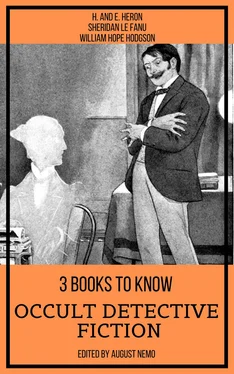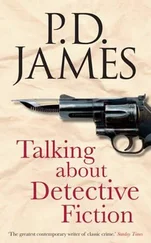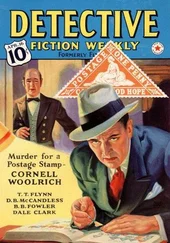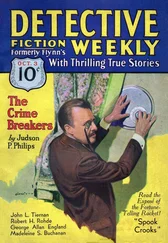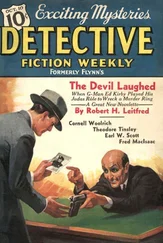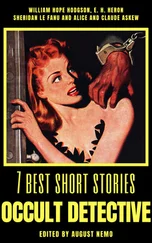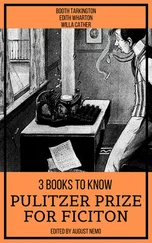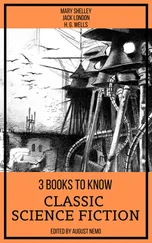––––––––

A Word for Those Who Suffer
My dear Van L — you have suffered from an affection similar to that which I have just described. You twice complained of a return of it.
Who, under God, cured you? Your humble servant, Martin Hesselius. Let me rather adopt the more emphasized piety of a certain good old French surgeon of three hundred years ago: “I treated, and God cured you.”
Come, my friend, you are not to be hippish. Let me tell you a fact.
I have met with, and treated, as my book shows, fifty-seven cases of this kind of vision, which I term indifferently “sublimated,” “precocious,” and “interior.”
There is another class of affections which are truly termed — though commonly confounded with those which I describe — spectral illusions. These latter I look upon as being no less simply curable than a cold in the head or a trifling dyspepsia.
It is those which rank in the first category that test our promptitude of thought. Fifty-seven such cases have I encountered, neither more nor less. And in how many of these have I failed? In no one single instance.
There is no one affliction of mortality more easily and certainly reducible, with a little patience, and a rational confidence in the physician. With these simple conditions, I look upon the cure as absolutely certain.
You are to remember that I had not even commenced to treat Mr. Jennings’ case. I have not any doubt that I should have cured him perfectly in eighteen months, or possibly it might have extended to two years. Some cases are very rapidly curable, others extremely tedious. Every intelligent physician who will give thought and diligence to the task, will effect a cure.
You know my tract on “The Cardinal Functions of the Brain.” I there, by the evidence of innumerable facts, prove, as I think, the high probability of a circulation arterial and venous in its mechanism, through the nerves. Of this system, thus considered, the brain is the heart. The fluid, which is propagated hence through one class of nerves, returns in an altered state through another, and the nature of that fluid is spiritual, though not immaterial, any more than, as I before remarked, light or electricity are so.
By various abuses, among which the habitual use of such agents as green tea is one, this fluid may be affected as to its quality, but it is more frequently disturbed as to equilibrium. This fluid being that which we have in common with spirits, a congestion found on the masses of brain or nerve, connected with the interior sense, forms a surface unduly exposed, on which disembodied spirits may operate: communication is thus more or less effectually established. Between this brain circulation and the heart circulation there is an intimate sympathy. The seat, or rather the instrument of exterior vision, is the eye. The seat of interior vision is the nervous tissue and brain, immediately about and above the eyebrow. You remember how effectually I dissipated your pictures by the simple application of iced eau-de-cologne. Few cases, however, can be treated exactly alike with anything like rapid success. Cold acts powerfully as a repellant of the nervous fluid. Long enough continued it will even produce that permanent insensibility which we call numbness, and a little longer, muscular as well as sensational paralysis.
I have not, I repeat, the slightest doubt that I should have first dimmed and ultimately sealed that inner eye which Mr. Jennings had inadvertently opened. The same senses are opened in delirium tremens, and entirely shut up again when the overaction of the cerebral heart, and the prodigious nervous congestions that attend it, are terminated by a decided change in the state of the body. It is by acting steadily upon the body, by a simple process, that this result is produced — and inevitably produced — I have never yet failed.
Poor Mr. Jennings made away with himself. But that catastrophe was the result of a totally different malady, which, as it were, projected itself upon the disease which was established. His case was in the distinctive manner a complication, and the complaint under which he really succumbed, was hereditary suicidal mania. Poor Mr. Jennings I cannot call a patient of mine, for I had not even begun to treat his case, and he had not yet given me, I am convinced, his full and unreserved confidence. If the patient do not array himself on the side of the disease, his cure is certain.
––––––––
––––––––
On this case Doctor Hesselius has inscribed nothing more than the words, “Harman’s Report,” and a simple reference to his own extraordinary Essay on “The Interior Sense, and the Conditions of the Opening thereof.”
The reference is to Vol. I., Section 317, Note Z^{a}. The note to which reference is thus made, simply says: “There are two accounts of the remarkable case of the Honourable Mr. Justice Harbottle, one furnished to me by Mrs. Trimmer, of Tunbridge Wells (June, 1805); the other at a much later date, by Anthony Harman, Esq. I much prefer the former; in the first place, because it is minute and detailed, and written, it seems to me, with more caution and knowledge; and in the next, because the letters from Dr. Hedstone, which are embodied in it, furnish matter of the highest value to a right apprehension of the nature of the case. It was one of the best declared cases of an opening of the interior sense, which I have met with. It was affected too, by the phenomenon, which occurs so frequently as to indicate a law of these eccentric conditions; that is to say, it exhibited what I may term, the contagious character of this sort of intrusion of the spirit-world upon the proper domain of matter. So soon as the spirit-action has established itself in the case of one patient, its developed energy begins to radiate, more or less effectually, upon others. The interior vision of the child was opened; as was, also, that of its mother, Mrs. Pyneweck; and both the interior vision and hearing of the scullery-maid, were opened on the same occasion. After-appearances are the result of the law explained in Vol. II., Section 17 to 49. The common centre of association, simultaneously recalled, unites, or reunites, as the case may be, for a period measured, as we see, in Section 37. The maximum will extend to days, the minimum is little more than a second. We see the operation of this principle perfectly displayed, in certain cases of lunacy, of epilepsy, of catalepsy, and of mania, of a peculiar and painful character, though unattended by incapacity of business.”
The memorandum of the case of Judge Harbottle, which was written by Mrs. Trimmer, of Tunbridge Wells, which Doctor Hesselius thought the better of the two, I have been unable to discover among his papers. I found in his escritoire a note to the effect that he had lent the Report of Judge Harbottle’s case, written by Mrs. Trimmer, to Dr. F. Heyne. To that learned and able gentleman accordingly I wrote, and received from him, in his reply, which was full of alarms and regrets, on account of the uncertain safety of that “valuable MS.,” a line written long since by Dr. Hesselius, which completely exonerated him, inasmuch as it acknowledged the safe return of the papers. The narrative of Mr. Harman, is therefore, the only one available for this collection. The late Dr. Hesselius, in another passage of the note that I have cited, says, “As to the facts (non-medical) of the case, the narrative of Mr. Harman exactly tallies with that furnished by Mrs. Trimmer.” The strictly scientific view of the case would scarcely interest the popular reader; and, possibly, for the purposes of this selection, I should, even had I both papers to choose between, have preferred that of Mr. Harman, which is given, in full, in the following pages.
Читать дальше
